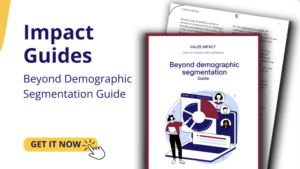
This week, we’re launching a new guidebook series at Valize, designed to share core ideas about strategy today in a convenient online format for using with your team or on your own. The first one has to do with customer behavior and the all-important understanding of how traditional segmentation lets us down. Here’s a little taste.

Traditional ways of segmenting customers – easy to do, compellingly quantifiable, and often strategically useless.
We’ve all been taught, and subjected to as consumers, that the most important things to know about customers are their demographics. How old are they? Where do they live? How much money have they got? Well, as we’ve learned from the relentless tracking of our search and other habits, advertisers and marketers are now learning that understanding behavior trumps understanding such characteristics.
As Shoshana Zuboff points out in her book Surveillance Capitalism, it’s “the unilateral claiming of private human experience as free raw material for translation into behavioral data.” As she points out, very few people would knowingly agree to give up so much personal information for the benefit of for-profit organizations that monetize it through advertisements.
The data-tracking companies have gone beyond just watching what we do to influencing what we do. As Zuboff puts it, “Surveillance capitalists now develop “economies of action,” as they learn to tune, herd, and condition our behavior with subtle and subliminal cues, rewards, and punishments that shunt us toward their most profitable outcomes.” As I’ve written about elsewhere, this can take the form of dark patterns in which our choice architectures are manipulated in a way that leads to people making choices that are not necessarily in their own best interests.
Change may well be afoot in these practices. Google reportedly pays Apple billions (that’s with a “b”) to be the default search engine on its phones. Billions to take advantage of people’s unwillingness to invest energy in finding a new search function – an operation that would take literally a few clicks. This arrangement is now drawing scrutiny in an antitrust suit against Google, arguing that it unlawfully throttles competition in its core search and advertising business. With more than half its search traffic coming from iPhones, the future of this cooperative arrangement has potentially huge consequences for both firms and of course for those of us who have come to depend on Google’s products for the basics of daily life.
The main claim to fame of the surveillance trackers is that their ability to collect data about you is used in part to make your experience better. This is in many cases, dubious. For instance, ever searched for a purchase you don’t make on a regular basis – a refrigerator, a toilet seat, or a mattress – and been bombarded for months after the purchase by ads for the same thing? Or in my case, I do a lot of searching for research purposes which I guess completely confuses the algorithm. Still, I find the Google tools to be addictively useful so I guess I shouldn’t complain too much.
So, are there ways of creating segmentation on the basis of behavior that doesn’t need to be creepily intrusive? There are.
Netflix and the use of algorithms to make your experience better
In some cases, the algorithms really do make your experience better, which to me is a win/win. An interesting case of using technology, experimentation, and algorithms to improve the customer experience for real can be seen in the case of Netflix. Instead of segmenting by age, for instance, the company is able to put groups of users into “communities” whose members share common interests in what they watch. They’ve added the ability for users to create ratings and are continually experimenting with refining the choices they offer people to help them make sense of the sea of possible content they might want to watch. Personalization can even go so far as the images shown to people when they scroll for content.
A second place where smart technology makes the user experience better is the Netflix recommendation engine or NRE for short. Some 80% of views on the platform come from the recommendation engine, so it is an incredibly powerful way of capturing user attention and offering just the right video content for that few spare hours of relaxation time.
While intense competition, costly original productions and of course the ongoing writer’s strike are taking their toll, Netflix is profitable and growing, earning its spot as the “ultimate influencer” in the streaming sector.
Defaults, Green bubbles, and blue bubbles
Another fascinating testament to the power of understanding what customers value is the great blue vs. green text message bubble competition in the United States. Messages on Apple phones are in blue. Virtually identical messages on an Android phone are green. The importance of this was drawn to my attention by our colleague Jerry Kim.
Apple’s strategy, which came to light in a legal dispute, was not to wall off Android users from its iMessage platform. Rather, it built a loyal following among young users by adding indispensable (to them) features such as emojis and dot-dot-dot icons to show that their correspondent is typing. It also makes it harder to include non-iPhone users in a text message chain. Eventually, being green came at a social cost.
As a Wall Street Journal article described, “Apple’s iMessage plays a significant role in the lives of young smartphone users and their parents, according to data and interviews with a dozen of these people. Teens and college students said they dread the ostracism that comes with a green text.
As one report noted, “…some young Android users have reported being ostracized and left out of group texts because their messages “turned the thread green,” leaving white text on a light-colored green background and eliminating some iMessage features. Analyst Ben Bajarin told Fast Company that his teenage son explained, “we would start a new group chat, and the group would realize I was the reason it was green, and they would start another group chat without me.”
The social pressure is palpable, with some reporting being ostracized or singled out after switching away from iPhones.” And despite a charm offensive from Google that smacks of desperation, Apple has indicated no interest in joining the standard they are proposing to level the playing field.
Our Learning Guides launch this week!
In an exciting development for us at Valize, we’re launching the first of our Learning Guides this week. They are a combination of online resources (such as videos and exercises), downloads, assessments, and application ideas. We are planning to release a guide in a week. For those who want a deeper dive, we will also be offering collections, which are six guides for the price of five. We believe there’s a market for learning as close to doing as possible and that’s what our guides are all about.
You can learn all about them and see the release schedule on our website.
Tune in as well on September 22 at 11:00 EST when Ron Boire and I will be chatting about the progress we’ve been making at Valize, the company designed to make innovation a proficiency in your organization. You can register to attend live here – we’ll be taking questions in real-time and would love to have you join us.
